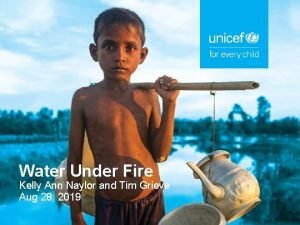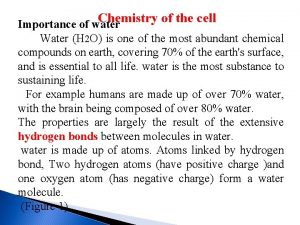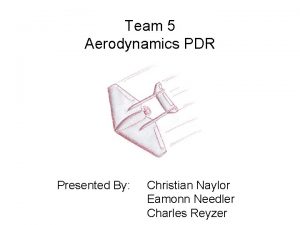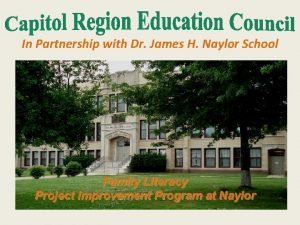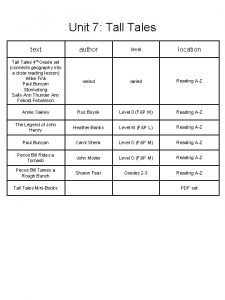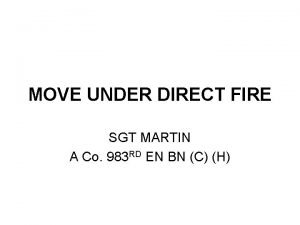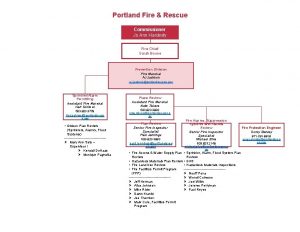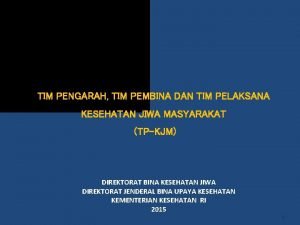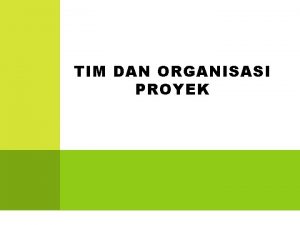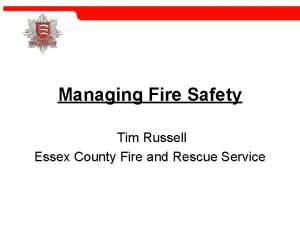Water Under Fire Kelly Ann Naylor and Tim













- Slides: 13

Water Under Fire Kelly Ann Naylor and Tim Grieve Aug 28, 2019

Fragility & Conflict- Humanitarian 800 million children live in fragile and conflict-affected settings 80% of the world’s poorest could be living in fragile contexts by 2030 120 million people were in humanitarian need in 2018 and 70. 8 million people were displaced, mostly by conflict –half are children Emergencies are more protracted: The average consecutive humanitarian annual appeal lasts 9 years (42% funded) The number of crises that demanded a response from international partners doubled over the last decade

58 fragile contexts (including 15 extremely fragile) in the OECD fragility framework 2018

Sustainable Devlepment Goal 6 Extremely fragile contexts compared with non fragile (JMP, 2019) • • • 3 x as likely to practice open defecation 4 x as likely to lack basic sanitation services 8 x as likely to lack basic drinking water services WASH SDGs (6. 1, 6. 2) • 1 in 5 countries on track to achieve basic drinking water target • 1 in 10 countries on track to achieve basic sanitation target – 9 countries coverage is decreasing 4 • Financing Gap: estimated at US$114 billion per year globally, of which US$60 billion per year is needed for fragile contexts.

Stop attacks on water and sanitation infrastructure and personnel. Deliberate and indiscriminate attacks on water and sanitation – and power supplies required for them to function – can be a violation of international humanitarian law. So, too, is the intentional denial of services. List of Principles on the Protection of Water Infrastructure – Geneva Water Hub (March 2019, GHLPWP, Matter of Survival)

Build a WASH sector capable of consistently providing high-quality water and sanitation services in emergencies. The WASH sector needs to build technical, operational and personnel capacity to address increasingly complex and protracted crises.

Humanitarian response, sustainable development and sustaining peace are three sides of the same triangle. ” - UN Secretary-General António Guterres

Link life-saving humanitarian responses to the development of sustainable water and sanitation systems for all, while taking opportunities to build peace. Agenda for Humanity- Core Responsibilities: • Prevent and end conflicts • Respect rules of war • Leave no one behind • Work differently to end need • Invest in humanity New Report: • Water Under Fire Volume 1: Emergencies, development and peace in fragile and conflictaffected contexts

Triple HDP Nexus - Practical Actions in Water Sector Prevent and End Conflict • Conflict sensitive approach • Opportunities for peace building, social cohesion Leave No One Behind • Inclusion of all vulnerable groups, especially IDPs, refugees, migrants From Delivering Aid to Ending Need • Strengthen WASH Sector resilience based on SWA building blocks • Multiyear hum-dev appeals and planning Invest in Humanity – financing • Convene new partnership models • Risk share by blending finance • Create service delivery models that attract financing (e. g. PPPs)


Public Private Partnerships (PPPs) PPP Strengthen WASH sector resilience • More efficient and sustainable business model for service delivery e. g. SHABA Water Corporation in • See notes below Boroma, Somaliland • WASH services can operate during protracted conflict due to political and financial independence Equity dimension – poor are willing to pay for a cheaper/more reliable service • PPP operated WASH systems can be as much as 15 times cheaper ($/m 3) than trucked/bottled water e. g. Sierra Leone, South Sudan, Somalia Well structured efficient PPPs with positive cashflow attract financing

UNICEF calls on governments, partners, and parties to conflict to: 12 1. Stop attacks on water and sanitation infrastructure and personnel. 2. Build a WASH sector capable of consistently providing high-quality water and sanitation services in emergencies. 3. Link life-saving humanitarian responses to the development of sustainable water and sanitation systems for all, while taking opportunities to build peace.

Asks – support the Call to Action! Political Engagement • Member states, donors, banks, UN agencies to lead on WASH resilience and inclusion agenda in these forums: • Finance Ministers Meeting (April 2020) • Global Refugee Forum (Dec 2019) Direct Engagement • • Operationalise recommendations in country, aligning programming around strengthening WASH resilience Focus on extremely fragile countries: Somalia, South Sudan, Central African Republic, Yemen, Democratic Republic of the Congo, Afghanistan, Chad, Syrian Arab Republic, Burundi, Ethiopia, Eritrea, Sudan, Haiti, Iraq, Mali
 Kelly ann naylor
Kelly ann naylor Water and water and water water
Water and water and water water Naylor meaning
Naylor meaning Naylor and briggs hypothesis
Naylor and briggs hypothesis Naylor shine tables
Naylor shine tables Ava naylor
Ava naylor Mean aerodynamic chord
Mean aerodynamic chord Dr stephen naylor
Dr stephen naylor Borious
Borious Davy crockett and the frozen dawn
Davy crockett and the frozen dawn Anne hathaway sonnet
Anne hathaway sonnet Flourishing under fire
Flourishing under fire Movement under direct fire
Movement under direct fire Reichstag fire who was the fire starter
Reichstag fire who was the fire starter
